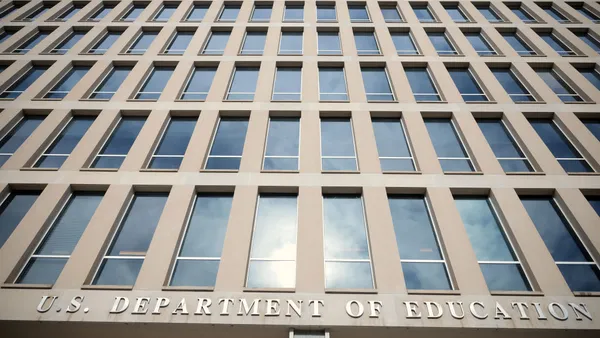Dive Brief:
- U.S. higher education is still "the envy of the world" due to the diversity of experiences it offers students, but accountability should be tailored to what makes institutions unique, said Diane Auer Jones, principal deputy under secretary at the U.S. Department of Education.
- The remarks were made Tuesday at the Council for Higher Education Accreditation's (CHEA) annual conference in Washington, D.C., in a discussion with the organization's president, Judith Eaton. They come after a year in which the department overhauled its accreditation rules in a contentious process.
- During the conversation, Eaton contextualized the environment for accreditors as subject to more political pressure and federal involvement than previously, and in which emerging educational models are extending their purview.
Dive Insight:
The department issued its final rules on accreditation in late October. Among the changes are the elimination of geographic boundaries for accreditors, effectively scrapping the concept of regional accreditation — a form of accreditation Eaton characterized as "highly prized" and a feature for which the U.S. higher education system is known.
Auer Jones said the decision was done in part to eliminate what she called "a two-tier system, which over time had become a two-class system" and to acknowledge that regional accreditors work outside their geographic boundaries vetting branch campuses.
The pair didn't touch on the Ed Department's recognition of the Accrediting Council for Independent Colleges and Schools (ACICS), a troubled national accreditor that recently withdrew its application to be recognized by CHEA after the organization said it didn't meet all of its standards. Late last year, the department flagged several compliance issues with the accreditor, whose federal recognition was revoked under the Obama administration, though it was restored in 2018 in a decision that contradicted findings from department career staff.
Other changes in the new accreditation rules:
- Loosen compliance standards for accreditors.
- Make it easier for colleges to undertake institutional change or get programs approved.
- Smooth the recognition path for new accreditors.
But some observers say the rulemaking left out key stakeholders and that the consensus reached was forced.
The rules aim to give accreditors more autonomy in how they choose to hold institutions accountable, Auer Jones said. However, critics have pointed out that doing so stands to weaken the accreditation system. She also suggested the proposed new rules will push accreditors that have historically covered a wide swath of institutions to tailor their oversight more specifically to each one's mission.
"Here's the news flash," she said. "If you have an institution that makes a promise to students that every interaction with a faculty member generates a different viewpoint ... and every student leaves a critical thinker and a problem solver, you'd better figure out how to measure that."
Whether the changes will spur the emergence of new accreditors focused on alternative credentials and other nontraditional education formats is unclear, and Auer Jones said the department doesn't have accreditors "waiting in the wings" to do that. The department, she said, also must work thoughtfully with accreditors to address other emerging issues in accreditation.
The Ed Department official cited the University of Maine System's plan to bring its seven separately accredited institutions into a singular accreditation, suggesting the department would be open to that type of arrangement for other state systems.
"Even within the current body of accreditors and especially with regard to state systems, I think we are going to have to see all kinds of new and creative ways to structure state systems to survive what we all know is a demographic shift" that's coming, she said. "And we're open to these ideas."
Eaton, leading the discussion, said accreditation is in a state of change and is subject to more political pressure, with the federal government having a stronger role in accountability than in the past, and with more interest in alternative education providers expanding the reach of quality assurance reviews.
"We're going to be grappling with all of those issues," she said.











